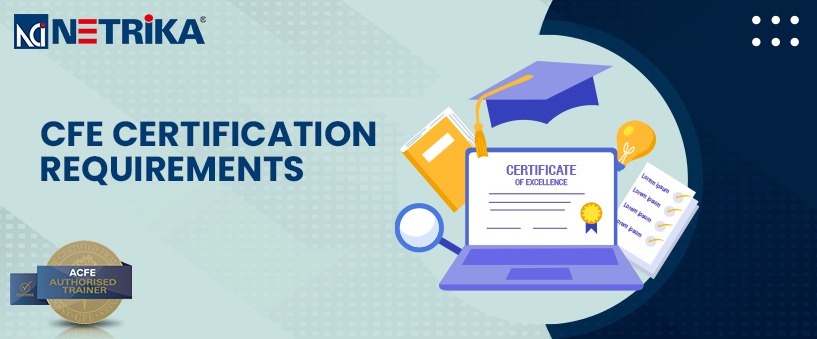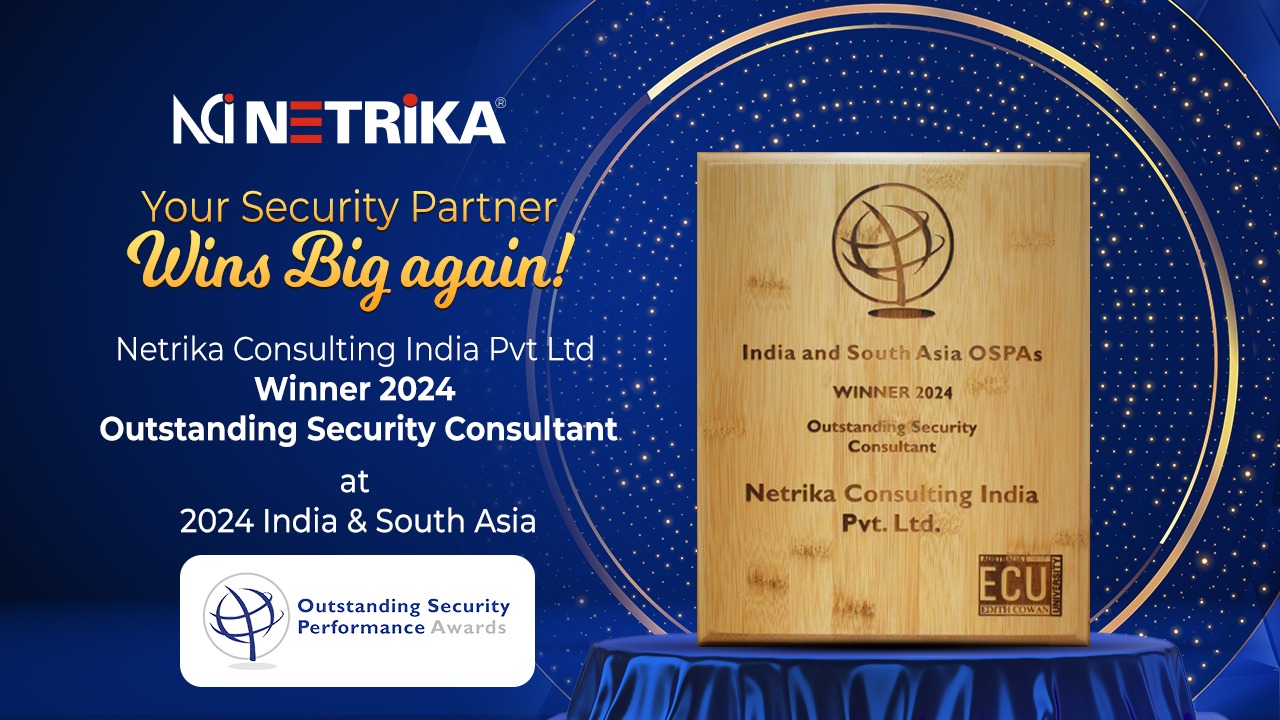News & Events
CFE Certification Requirements
- June 27, 2023
- Posted by: marketing@netrika.com
- Category: Blogs

CFE Certification Requirements
A fraud investigator certification validates your competence to assist organisations in identifying and prosecuting criminals who use deceit for personal or financial advantage. Because different organisations issue these certifications, the standards differ. In addition to passing exams, candidates must often have a specific level of education and professional experience.
An aspiring fraud investigator with a professional credential can work in institutions such as banks, hospitals, and private agencies. Your qualification through CFE certification course allows you to investigate credit card, insurance claims, postal, investment, telemarketing, business transactions, and other sorts of fraud.
ACFE Certification also implies that you can:
- Interview the victims, witnesses, and suspects.
- Gather and examine evidence
- Obtain warrants for searches and subpoenas.
- Install surveillance
- Reports must be written.
- Give testimony in court
- Teach others how to spot and avoid fraud.
- Work with law enforcement and prosecutors.
- Use powerful fraud detection technology.
The requirements a professional needs to meet to become a Certified Fraud Investigator
The ACFE is the world’s largest anti-fraud body and the premier anti-fraud education and training provider. The ACFE, with the support of its more than 90,000 members, minimises business fraud worldwide and increases public faith in the profession’s neutrality and honesty.
To gain the CFE certification, a professional must meet the basic requirements as per ACFE certification guidelines.
- Become a member of the ACFE.
The ACFE allows only associate members to take the CFE exam and receive the associated certificate. You can sign up for the ACFE website and receive various collateral to assist you in becoming a CFE. Members can access free webinars, training material discounts, unique job boards, and global networking possibilities.
- Earn your bachelor’s degree
Most CFEs have a bachelor’s degree, which helps them meet the exam’s minimum requirements. Your degree can be in any subject as long as it is from an authorised university. If you’re still deciding on a degree, consider accounting, finance, economics, law, or cybersecurity. These topics will assist you in preparing for the CFE certification course exam and your future profession as a fraud investigator.
- Have two years of relevant experience
Professionals on their path to earning the ACFE certification credential must have at least two years of experience in the identification or deterrent of fraud, according to the ACFE. Even if your work responsibilities are not directly related to fraud, the board may consider your experience if they are relevant enough. Work experience that qualifies is an example of:
- Accounting and auditing: Work experience that qualifies involves analysing an organisation’s fraud risk, spotting unexpected trends by interpreting financial data, and determining accounting system deficiencies.
- Criminology and sociology: Individuals in the criminology and sociology professions have unique perspectives when determining why people commit fraud.
- Loss prevention: Some ACFE certification course applicants qualify for the exam using their loss prevention experience as security directors or security consultants.
- Law: Many prosecutors and litigators specialise in fraud, which might aid CFE certification preparation.
- Fraud investigation: You can qualify by assisting private enterprises or municipal, state, or federal agencies in identifying fraud.
- Examine the qualification point system
To determine eligible candidates, the ACFE employs a point system. You can apply for the CFE exam with at least 40 points. ACFE certification requires at least 50 points and two years of related job experience. Use the tool to calculate your overall number of points and plan for future school or career endeavours. For example, if you have at least two years of fraud-related experience and other professional credentials, you may be eligible even if you don’t have a bachelor’s degree.
- Prepare for the CFE exam
The CFE certification course exam is divided into the following sections:
- Financial Transactions and Fraud Schemes
- Law
- Investigation
- Fraud Prevention and Deterrence
While your education and job experience can help you gain knowledge in these areas, the ACFE recommends enrolling in the CFE Certification Course. This extensive course has over a thousand study questions to help you prepare for the exam. After completing each question, you will be given the correct answer, a brief explanation, and a reference for further research. The training also includes practice exams that simulate the actual testing atmosphere. The ACFE states that applicants are considered thoroughly prepared for the exam after completing the study questions and scoring 85% or above on each practice exam.
Participants in Netrika’s CFE certificate course can improve their professional visibility and reputation while also boosting their marketability and job security abroad. Netrika uses the instructor-led CFE training session to empower professionals and promote awareness for the company to reduce potential frauds and the risk of one that has already impacted the corporation.
FAQ
Is CFE a good certification?
Simply yes! According to the world's largest anti-fraud organization, the Association of Certified Fraud Examiners (ACFE), certified fraud examiners earn 31% more than examiners who are not certified.
How valuable is CFE certification?
Certified Fraud Examiners (CFEs) possess unique expertise in preventing and detecting fraud, and are highly valued by organizations spanning all industries, sectors and sizes. CFE has emerged as the gold standard in the area of fraud.
What is the CFE certification
Certified Fraud Examiners (CFEs) are respected in every industry, recognized around the world and feared by every fraudster. Why? Because earning the CFE credential requires commitment — along with time, focus and a passion for fighting fraud.
What is the value of CFE?
CFE certification bestows a sense of prestige and credibility upon professionals in the field of fraud examination. The rigorous requirements and comprehensive examination process of the CFE certification ensure that certified individuals possess the necessary knowledge and skills to combat fraud effectively.

